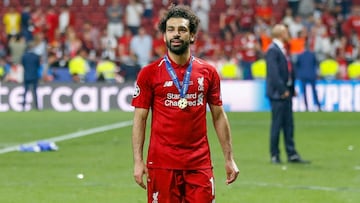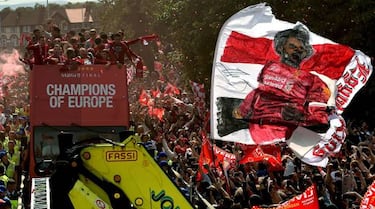Salah at Liverpool sees hate crimes and Islamophobia drop
A study carried out by the Immigration Policy Lab has concluded that there has been a hugely positive impact on Merseyside due to the 'Egyptian King'.


Mohamed Salah transcends beyond the field of play. The Egyptian, who opened the scoring from the penalty spot in the Champions League final for Liverpool, has been an Anfield idol since shortly after his arrival and this has had knock-on effects on the city as a whole, with a fall seen in Islamophobia and hate crime.
Salah exposure reduces society ills
The study, carried out by the Immigration Policy Lab of Stanford University, stated that there was an 18.9% fall in hate crimes across Merseyside - the English county in which Liverpool is situated - since the Egyptian signed for the club. This drop was based on the expected rate of crimes had he not joined and there was no comparable effect from other offences.
The authors of the report, Ala 'Alrababa'h, William Marble, Salma Mousa and Alexandra Siegel, explained their findings.
"Taken together, the evidence points to Salah’s rise in prominence causing a decrease in hate crimes in Liverpool FC's home county. The survey experiment suggests that these results may be driven by increased familiarity with Islam.

“These findings suggest that positive exposure to outgroup celebrities can reveal new and humanising information about the group at large, reducing prejudiced attitudes and behaviours”.
The research put forward that Salah was a figure that helped fans familiarise themselves with the Islamic community, which in turn eliminated some prejudices. The study looked at 936 reports on hate crimes and 15 million tweets from fans across the UK, with another focus on 8,000 Liverpool supporters.
In conclusion, the study found that Islamophobic tweets from Liverpool fans dropped from 7.2% to 3.4% compared to those of other big English clubs over the same period, and hate crimes against the Muslim community dropped by 18.9%.
"Salah is often seen joking with his teammates with a signature grin, entertaining his young daughter on the sidelines, and respecting his opponents almost to a fault, for instance, by refusing to celebrate goals against his former clubs," read the report, focusing on the player's personality, as well as footballing ability, as a reason that he has been taken to the hearts of Reds' fans and others.
Salah chants bring communities together
“By watching games, post-game interviews, promotional videos released by the club, and content on Salah’s social media pages, fans are exposed to rich information about Salah’s life on and off the field. Viewers see what a Muslim prayer looks like, perhaps for the first time, when Salah scores,” it continued. There was also a positive effect from pro-Muslim songs that have emerged from the Anfield faithful, including references about wanting to be in a Mosque.
Related stories
The positive reaction to Salah from Liverpool fans contrasts with some recent examples in football of racist behaviour including insults towards Man City's Raheem Sterling at Stamford Bridge or in the case of Tottenham's Danny Rose, who said he was looking forward to ending his professional career because of it.
Salah scored the third fastest goal of Champions League finals as he set up Jürgen Klopp's side for their sixth European Cup trophy.

